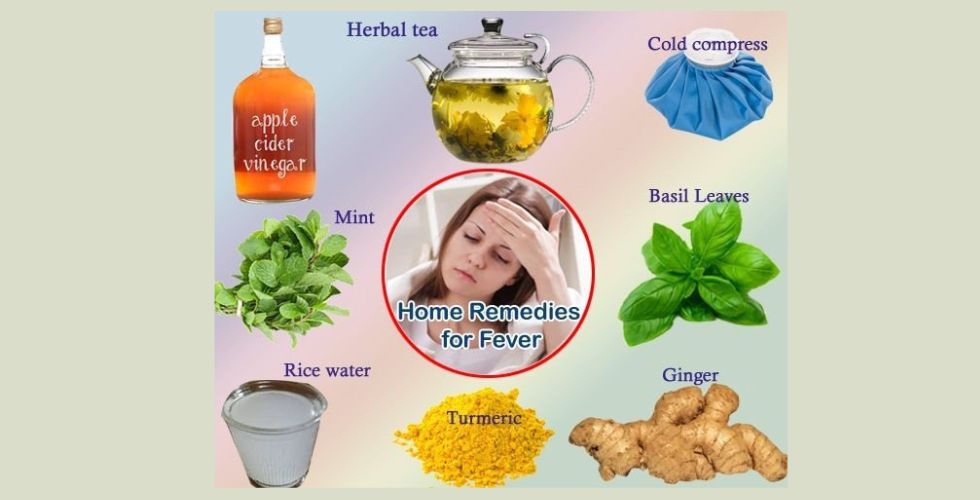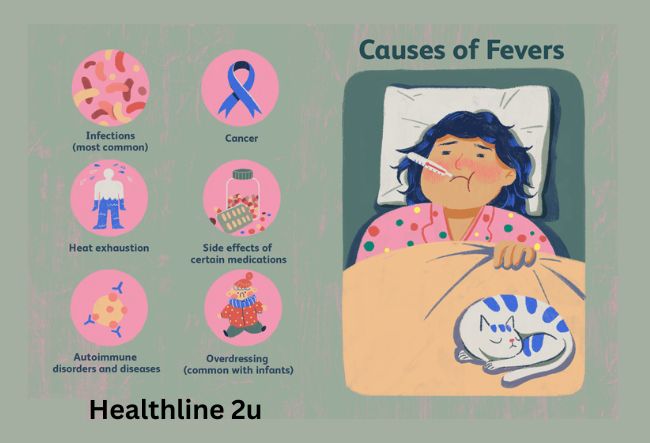- 1 Introduction
- 2 Understanding Fever
- 3 Common Causes of Fever
- 4 Importance of Natural Remedies
- 5 When to Seek Medical Attention
- 6 Prevention is Better Than Cure
- 7 Important Considerations
- 8 Conclusion
- 9 FAQs About Natural Remedies For Fever
- 9.1 Can natural remedies replace conventional medicine for fever?
- 9.2 Are herbal teas safe for children with a fever?
- 9.3 How long should one try natural remedies before seeking medical help?
- 9.4 Can essential oils be applied directly to the skin during a fever?
- 9.5 Are there specific foods to avoid during a fever?
- 9.6 How can I reduce my fever naturally?
- 9.7 Is Ginger good for fever?
- 9.8 Which juice is good for fever?
- 9.9 How to use garlic for fever?
- 9.10 Which leaf cures fever?
- 9.11 Can fever be cured at home?
Introduction
Natural Remedies for Fever, Fever, a temporary rise in body temperature, is a natural defense system against illness. While it can be uncomfortable, it’s often a sign that your body is fighting off an infection. However, when a fever becomes too high or persistent, seeking medical attention is crucial. This article explores natural remedies for fever, emphasizing their limitations and highlighting the importance of medical guidance.

Understanding Fever
Before diving into natural remedies for fever, it’s crucial to understand fever’s role in the body. A fever frequently indicates that the body is battling an illness. It’s a natural response to help the body heal itself.
1. Normal body temperature: 98.6°F (37°C) orally, slightly higher rectally.
2. Fever: Body temperature exceeding 99.5°F (37.5°C) orally or 100.4°F (38°C) rectally.
3. Types of fever: Low-grade (99.5°F – 100.9°F), moderate (101°F – 102.9°F), high (103°F – 104.9°F), and hyperpyrexia (105°F or higher).
Also Read : How to Get Rid of Heartburn Fast
Common Causes of Fever
Explore the various reasons behind a fever, ranging from viral and bacterial infections to inflammatory conditions. Understanding the cause is pivotal in choosing the right remedy.

Importance of Natural Remedies
Natural remedies for fever offer a holistic approach to fever management, focusing on the root cause rather than just symptom relief. They often have fewer side effects compared to pharmaceutical options.
1. Herbal Teas and Infusions
One effective way to reduce fever is through herbal teas and infusions. Delve into the world of chamomile, peppermint, and ginger teas, known for their anti-inflammatory and immune-boosting properties.
1. Chamomile tea: Known for its calming and sleep-promoting properties, chamomile tea can aid relaxation and rest.
2. Peppermint tea: May help reduce fever and nausea.
3. Elderberry: Studies suggest elderberry extract might shorten the duration of colds and flu, but its effectiveness against fever specifically is less clear.
2. Essential Oils and Aromatherapy
Harness the power of essential oils like eucalyptus and lavender through aromatherapy. Learn how inhaling these oils can help reduce fever and provide relief from associated symptoms.

3. Cooling Measures
1. Lukewarm sponge baths: Use lukewarm (not cold) water to sponge your body, focusing on areas like the forehead, armpits, and groin. Avoid using alcohol or rubbing alcohol, which can be counterproductive.
2. Light clothing and loose bedding: Dress in breathable fabrics and avoid bundling up, which can trap heat.
3. Cool compresses: Apply cool, damp cloths to your forehead, neck, or wrists.
Also Read : Types of Fever
4. Power of Hydration
Staying hydrated is crucial during a fever, and this technique is used in Natural Remedies for Fever. Explore the significance of water, electrolyte-rich drinks, and herbal concoctions in maintaining proper hydration levels.
Electrolyte-rich liquids, such as ORS or coconut water, might be beneficial, particularly if you’re experiencing diarrhoea or vomiting.

5. Foods That Fight Fever
Certain foods possess fever-fighting properties. Discover a variety of fruits, vegetables, and nutrient-rich options that can aid in the recovery process.
1. Light, easily digestible foods like fruits, vegetables, and yogurt are preferable. Avoid heavy, greasy, or spicy meals that can strain your digestive system.
2. Ginger: Considered a natural anti-inflammatory, ginger tea or broth can be soothing. Consult your doctor before using ginger if you have certain medical conditions.
6. Rest and Sleep
Often underestimated, adequate rest and sleep play a vital role in recovery. Understand how the body heals during restful periods and why it’s essential during a fever.
1. Fever is your body’s call to rest and recover. Get plenty of sleep in a cool, comfortable environment.
2. Avoid strenuous activities that can further elevate your temperature.

When to Seek Medical Attention
While natural remedies for fever can be powerful, knowing when to seek medical help is crucial. Highlight signs and symptoms that indicate a need for professional intervention.
Prevention is Better Than Cure
Explore preventive measures to minimize the risk of fever, including lifestyle adjustments, hygiene practices, and immune-boosting habits.
Here Is Detailed Video Guide About Natural Remedies For Fever
Important Considerations
1. Always consult a doctor before using any natural remedies for fever, especially for children, pregnant women, or individuals with underlying health conditions.
2. Natural remedies for fever should not be used as a substitute for professional medical advice or treatment.
3. If your fever is high (over 103°F), persistent (lasting more than 3 days), accompanied by severe symptoms like confusion, difficulty breathing, or a stiff neck, seek immediate medical attention.
Remember
1. Fever is a symptom, not a disease itself. Identifying the underlying cause and treating it appropriately is crucial.
2. Natural remedies for fever can offer comfort and support during a fever, but they should not be used as a replacement for seeking medical attention when necessary.
3. Listen to your body and prioritize rest, hydration, and seeking professional guidance when needed.
Conclusion
In conclusion, natural remedies for fever offer a gentle and effective approach to managing this common ailment. Integrating these practices into your routine not only provides relief but also supports overall health and well-being.
FAQs About Natural Remedies For Fever
Can natural remedies replace conventional medicine for fever?
Natural remedies can complement conventional medicine but should not replace it entirely. Consult a healthcare professional for severe cases.
Are herbal teas safe for children with a fever?
Herbal teas should be used cautiously in children. Consult with a pediatrician before introducing them into a child’s diet.
How long should one try natural remedies before seeking medical help?
If fever persists for more than a couple of days or worsens, it’s essential to consult a healthcare professional promptly.
Can essential oils be applied directly to the skin during a fever?
Essential oils should be diluted before skin application. Always follow proper guidelines and consult with an aromatherapist if unsure.
Are there specific foods to avoid during a fever?
Spicy and heavy foods may exacerbate fever symptoms. Opt for light, easily digestible options until the fever subsides.
How can I reduce my fever naturally?
Here are some general tips for reducing fever naturally that have not been evaluated by a medical professional:
1. This is the most crucial step. Drink plenty of fluids like water, clear broths, herbal teas, or diluted fruit juices. Aim for small sips frequently throughout the day.
2. Electrolyte-rich fluids like coconut water or oral rehydration solutions (ORS) can be helpful, especially if you have vomiting or diarrhea.
3. Lukewarm sponge baths: Use lukewarm (not cold) water to sponge your body, focusing on areas like the forehead, armpits, and groin. Avoid using alcohol or rubbing alcohol, which can be counterproductive.
4. Light clothing and loose bedding: Dress in breathable fabrics and avoid bundling up, which can trap heat.
5. Cool compresses: Apply cool, damp cloths to your forehead, neck, or wrists.
6. Chamomile tea: Known for its calming and sleep-promoting properties, chamomile tea can aid relaxation and rest.
7. Peppermint tea: May help reduce fever and nausea.
8. Elderberry: Studies suggest elderberry extract might shorten the duration of colds and flu, but its effectiveness against fever specifically is less clear.
9. Sleep and Rest: Fever is your body’s call to rest and recover. Get plenty of sleep in a cool, comfortable environment.
Is Ginger good for fever?
Yes, Ginger is good for Fever. Ginger is an additional remedy for a mild temperature. Ginger is beneficial against fever, cough, and other common ailments because of its antimicrobial qualities. Check your grocery store for ginger-based tea, or prepare a homemade cup at home with sliced ginger root.
Which juice is good for fever?
Vitamin C and flavonoids are found in high concentrations in citrus fruits, which include oranges, lemons, and grapefruits. These may aid in the battle against a fever by reducing inflammation and boosting immunity. Quercetin, a flavonoid also present in berries, has been linked in certain studies to potential therapeutic benefits for rhinovirus infections.
How to use garlic for fever?
These characteristics of garlic help to reduce body temperature. Add one clove of crushed garlic to a cup of boiling water. After letting it steep for at least ten minutes, strain it. To reduce your temperature, use this mixture at least twice a day.
Which leaf cures fever?
One of the most successful treatments for dengue fever is papaya leaf juice. This ancient remedy, when used in conjunction with allopathic medications, works amazingly well to lower body temperature. Blood platelet counts are decreased by dengue fever, yet it is well known that papaya leaf extract can raise platelet counts.
Can fever be cured at home?
Most of the time, someone can treat a fever at home. Generally speaking, a fever doesn’t need medical attention. On the other hand, taking over-the-counter drugs might help someone feel more comfortable and reduce their body temperature. It’s crucial to keep in mind that certain drugs are inappropriate for kids less than a specific age.